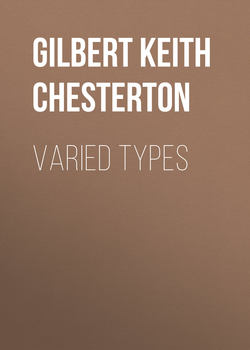Varied Types

Реклама. ООО «ЛитРес», ИНН: 7719571260.
Оглавление
Gilbert Keith Chesterton. Varied Types
CHARLOTTE BRONTË
WILLIAM MORRIS AND HIS SCHOOL
OPTIMISM OF BYRON
POPE AND THE ART OF SATIRE
FRANCIS
ROSTAND
CHARLES II
STEVENSON1
THOMAS CARLYLE
TOLSTOY AND THE CULT OF SIMPLICITY
SAVONAROLA
THE POSITION OF SIR WALTER SCOTT
BRET HARTE
ALFRED THE GREAT
MAETERLINCK
RUSKIN2
QUEEN VICTORIA
THE GERMAN EMPEROR
TENNYSON
ELIZABETH BARRETT BROWNING
Отрывок из книги
It is proper enough that the unveiling of the bust of William Morris should approximate to a public festival, for while there have been many men of genius in the Victorian era more despotic than he, there have been none so representative. He represents not only that rapacious hunger for beauty which has now for the first time become a serious problem in the healthy life of humanity, but he represents also that honourable instinct for finding beauty in common necessities of workmanship which gives it a stronger and more bony structure. The time has passed when William Morris was conceived to be irrelevant to be described as a designer of wall-papers. If Morris had been a hatter instead of a decorator, we should have become gradually and painfully conscious of an improvement in our hats. If he had been a tailor, we should have suddenly found our frock-coats trailing on the ground with the grandeur of mediæval raiment. If he had been a shoemaker, we should have found, with no little consternation, our shoes gradually approximating to the antique sandal. As a hairdresser, he would have invented some massing of the hair worthy to be the crown of Venus; as an ironmonger, his nails would have had some noble pattern, fit to be the nails of the Cross.
The limitations of William Morris, whatever they were, were not the limitations of common decoration. It is true that all his work, even his literary work, was in some sense decorative, had in some degree the qualities of a splendid wall-paper. His characters, his stories, his religious and political views, had, in the most emphatic sense, length and breadth without thickness. He seemed really to believe that men could enjoy a perfectly flat felicity. He made no account of the unexplored and explosive possibilities of human nature, of the unnameable terrors, and the yet more unnameable hopes. So long as a man was graceful in every circumstance, so long as he had the inspiring consciousness that the chestnut colour of his hair was relieved against the blue forest a mile behind, he would be serenely happy. So he would be, no doubt, if he were really fitted for a decorative existence; if he were a piece of exquisitely coloured card-board.
.....
Men can only join in a chorus of praise, even if it is the praise of denunciation. The man who is popular must be optimistic about something, even if he is only optimistic about pessimism. And this was emphatically the case with Byron and the Byronists. Their real popularity was founded not upon the fact that they blamed everything, but upon the fact that they praised something. They heaped curses upon man, but they used man merely as a foil. The things they wished to praise by comparison were the energies of Nature. Man was to them what talk and fashion were to Carlyle, what philosophical and religious quarrels were to Omar, what the whole race after practical happiness was to Schopenhauer, the thing which must be censured in order that somebody else may be exalted. It was merely a recognition of the fact that one cannot write in white chalk except on a black-board.
Surely it is ridiculous to maintain seriously that Byron's love of the desolate and inhuman in nature was the mark of vital scepticism and depression. When a young man can elect deliberately to walk alone in winter by the side of the shattering sea, when he takes pleasure in storms and stricken peaks, and the lawless melancholy of the older earth, we may deduce with the certainty of logic that he is very young and very happy. There is a certain darkness which we see in wine when seen in shadow; we see it again in the night that has just buried a gorgeous sunset. The wine seems black, and yet at the same time powerfully and almost impossibly red; the sky seems black, and yet at the same time to be only too dense a blend of purple and green. Such was the darkness which lay around the Byronic school. Darkness with them was only too dense a purple. They would prefer the sullen hostility of the earth because amid all the cold and darkness their own hearts were flaming like their own firesides.
.....